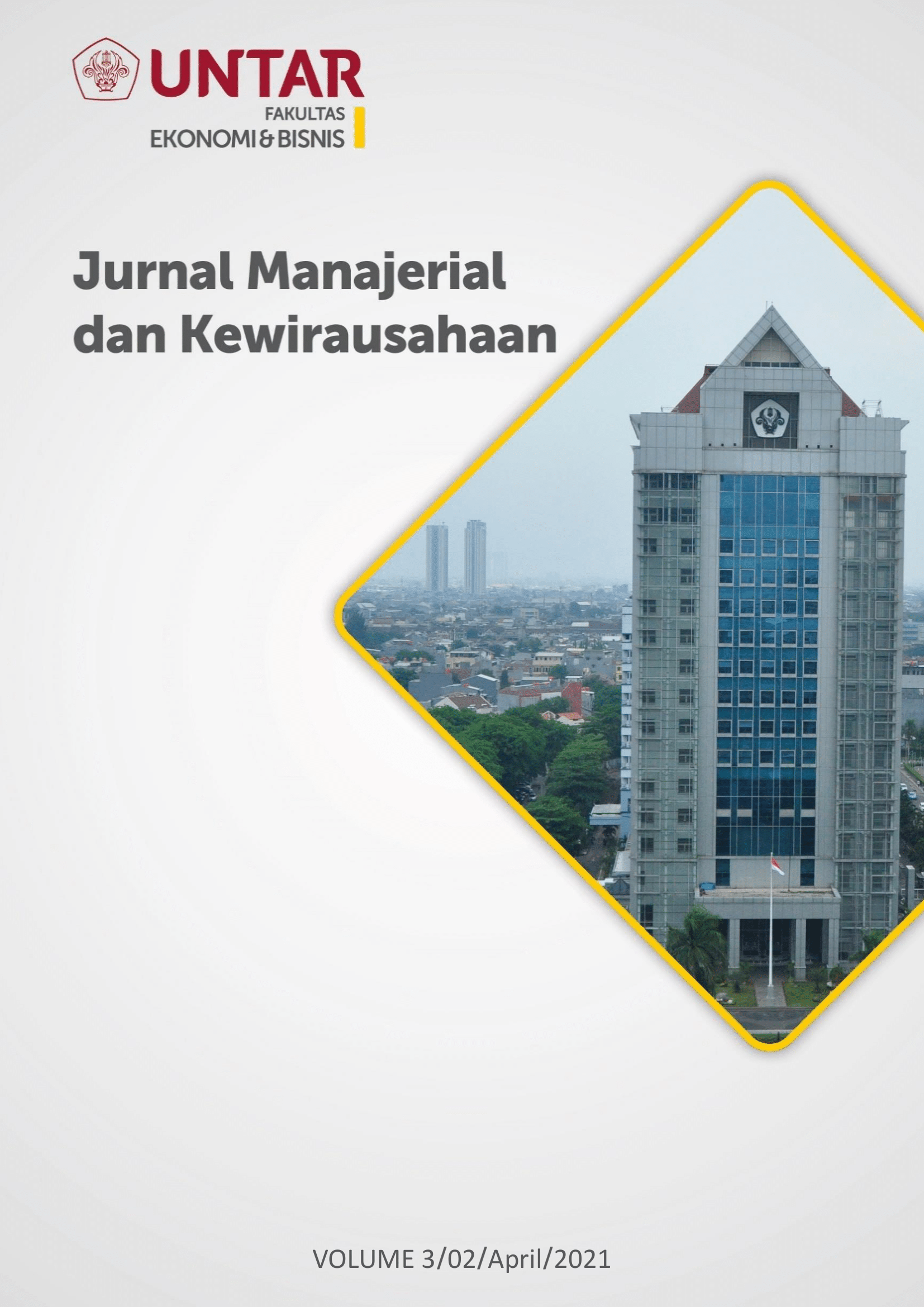Pengaruh Close Environmental Factors Terhadap Entrepreneurial Intentions Dimediasi Oleh Individual Entrepreneurial Orientation
Main Article Content
Abstract
The purpose of this study was to examine whether the close environmental factors near students influenced their entrepreneurial intentions and was mediated by individual entrepreneurial orientation in students of the Management Department, Faculty of Economics and Business, Tarumanagara University. Using descriptive research methods processed with SmartPLS 3.3.2. The number of samples used in the study were 121 student respondents who had taken entrepreneurship courses. The results showed that individual entrepreneurial orientation mediated the relationship between environmental factors near students and entrepreneurial intentions, but the stigma of entrepreneurial failure had no effect on entrepreneurial intentions.
Tujuan dari penelitian ini adalah untuk menguji apakah faktor lingkungan dekat mahasiswa berpengaruh terhadap niat berwirausaha mereka dan di mediasi oleh orientasi kewirausahaan individu pada mahasiswa/i Jurusan Manajemen Fakultas Ekonomi dan Bisnis Universitas Tarumanagara. Menggunakan metode penelitian deskriptif yang diolah dengan SmartPLS 3.3.2. Jumlah sampel yang digunakan dalam penelitian sebanyak 121 responden mahasiswa yang telah mengambil mata kuliah kewirausahaan. Hasil penelitian menunjukan bahwa orientasi kewirausahaan individu memediasi hubungan antara faktor lingkungan dekat mahasiswa dengan niat berwirausaha, tetapi stigma tentang kegagalan kewirausahaan tidak berpengaruh terhadap niat berwirausaha.
Article Details
Section
This work is licensed under a Jurnal Muara Ilmu Ekonomi dan Bisnis Creative Commons Attribution-ShareAlike 4.0 International License.,/p>
References
Ajzen, I. (1991). The Theory of Planned Behavior. Organizational Behavior and Human Decision Processes, 50, 179-211.
Ambad, S. N., & Damit, D. H. (2016). Determinants of Entrepreneurial Intention among Undergraduate Students in Malaysia. Procedia Economics and Finance, 37, 108-114.
Armour, J., & Cumming, D. (2008). Bankruptcy Law and Entrepreneurship. Working Paper N°.105.
Bolton, D. L., & Lane, M. D. (2012). Individual Entrepreneurial Orientation: Development Of A Measurement Instrument.
Cacciotti, G., Hayton, J. C., Mitchell, J. R., & Giazitzoglu, A. (2016). A Reconceptualization Of Fear Of Failure In Entrepreneurship. Journal of Business Venturing, 31, 302-325.
Carr, J. C., & Sequeira, J. M. (2007). Prior Family Business Exposure As Intergenerational Influence and Entrepreneurial Intent: A Theory of Planned Behavior Approach. Journal of Business Research, 60, 1090 –1098.
Covin, J. G., & Wales, W. J. (2019). Crafting High-Impact Entrepreneurial Orientation Research: Some Suggested Guidelines. Entrepreneurship Theory and Practice, Vol. 43(I), 3-18.
Dai, L., Maskimov, V., Gilbert, B. A., & Fernhaber, S. A. (2014). Entrepreneurial Orientation And International Scope: The Differential Roles Of Innovativeness, Proactiveness, And Risk-Taking. Scholarship and Professional Work - Business.
Dewi, N. P., & Nurcaya, I. N. (2017). Niat Berwirausaha Di Kalangan Mahasiswa Fakultas Ekonomi Dan Bisnis Universitas Udayana Dan Universitas Warmadewa. E-Jurnal Manajemen Unud, Vol. 6, No. 4, 2191-2221.
Engle, R. L., Dimitriadi, N., Gavidia, J. V., Schlaegel, C., Delanoe, S., Alvarado, I., . . . Wolff, B. (2010). Entrepreneurial Intent A Twelve-Country Evaluation Of Ajzen’s Model Of Planned Behaviour.
Gieure, C., Benavides-Espinosa, M. d., & Roig-Dobón, S. (2019). Entrepreneurial Intentions In An International University Environment.
Goktan, A. B., & Gupta, V. K. (2015). Sex, Gender, And Individual Entrepreneurial Orientation: Evidence From Four Countries. International Entrepreneurship Management Journal, 11, 95-112.
Gupta, V. K., Niranjan, S., Goktan, B. A., & Eriskon, J. (2016). Individual Entrepreneurial Orientation Role In Shaping Reactions To New Technologies. International Entrepreneurship Management Journal, 12, 935-961.
Gurel, E., Altinay, L., & Daniele, R. (2010). Tourism Students’ Entrepreneurial Intentions. Annals of Tourism Research, Vol. 37, No. 3, 646-669.
Iakovleva, T., Kolvereid, L., & Stephan, U. (2011). Entrepreneurial Intentions in Developing and Developed Countries. Education + Training, Vol. 53, No. 5, 353-370.
J. Baumol, W. (1993). Formal Entrepreneurship Theory In Economics: Existence And Bounds. Journal of Business Venturing, Vol. 8, Issue 3, 197-210.
Koe, W. L. (2016). The Relationship Between Individual Entrepreneurial Orientation (IEO) And Entrepreneurial Intention. Journal of Global Entrepreneurship Research, 6-13.
Landier, A. (2006). Entrepreneurship And The Stigma Of Failure.
Liñán, F., D. U., & Guerrero, M. (2011b). Regional Variations in Entrepreneurial Cognitions: Start-Up Intentions of University Students in Spain.
Liñán, F., Santos, F. J., & Fernández, J. (2011a). The Influence Of Perceptions On Potential Entrepreneurs. International Entrepreneurship Management Journal, 7, 373-390.
Marques, C. S., Ferreira, J. J., Ferreira, F. A., & Lages, M. F. (2013). Entrepreneurial Orientation And Motivation To Start Up A Business: Evidence From The Health Service Industry. International Entrepreneurship and Management Journal, Vol. 9(1), 77-94.
Martins, I., & Perez, J. P. (2019). Testing Mediating Effects Of Individual Entrepreneurial Orientation On The Relation Between Close Environmental Factors And Entrepreneurial Intention.
Martins, I., Monsalve, J. P., & Martinez, A. V. (2018). Self-confidence And Fear Of Failure Among University Students And Their Relationship With Entrepreneurial Orientation: Evidence From Colombia.
Nanda, R., & Sørensen, J. B. (2010). Workplace Peers and Entrepreneurship.
Pruett, M., Shinnar, R., Toney, B., Llopis, F., & Fox, J. (2009). Explaining Entrepreneurial Intentions Of University Students: A Cross-Cultural Study.
Rauch, A., Wiklund, J., Lumpkin, G. T., & Frese, M. (2009). Entrepreneurial Orientation And Business Performance: An Assessment Of Past Research And Suggestions For The Future. Entrepreneurship Theory and Practice.
Robinson, S., & Stubberud, H. A. (2014). Elements Of Entrepreneurial Orientation And Their Relationship To Entrepreneurial Intent. Journal of Entrepreneurship Education, Vol.17, No. 2.
Santos, F. J., Roomi, M. A., & Liñán, F. (2016). About Gender Differences and the Social Environment in the Development of Entrepreneurial Intentions. Journal of Small Business Management, 54(1), 49-66.
Shapero, A., & Sokol, L. (1982). The social dimensions of entrepreneurship. Encyclopedia of entrepreneurship, 72-90.
Simmons, S. A., Wiklund, J., & Levie, J. (2014). Stigma and Business Failure: Implications For Entrepreneurs' Career Choices. Small Business Economics 42, 485–505.
Sumadi, A. R., & Sulistyawati, E. (2017). Pengaruh Sikap, Motivasi, Dan Lingkungan Terhadap Niat Berwirausaha. E-Jurnal Manajemen Unud, Vol. 6, No. 2, 1007-1029.
Thompson, E. R. (2009). Individual Entrepreneurial Intent: Construct Clarification and Development of an Internationally Reliable Metric.
Wales, W. J., Gupta, V. K., & Mousa, F. T. (2013). Empirical Research On Entrepreneurial Orientation: An Assessment And Suggestions For Future Research. International Small Business Journal, 31(4), 357 –383.

